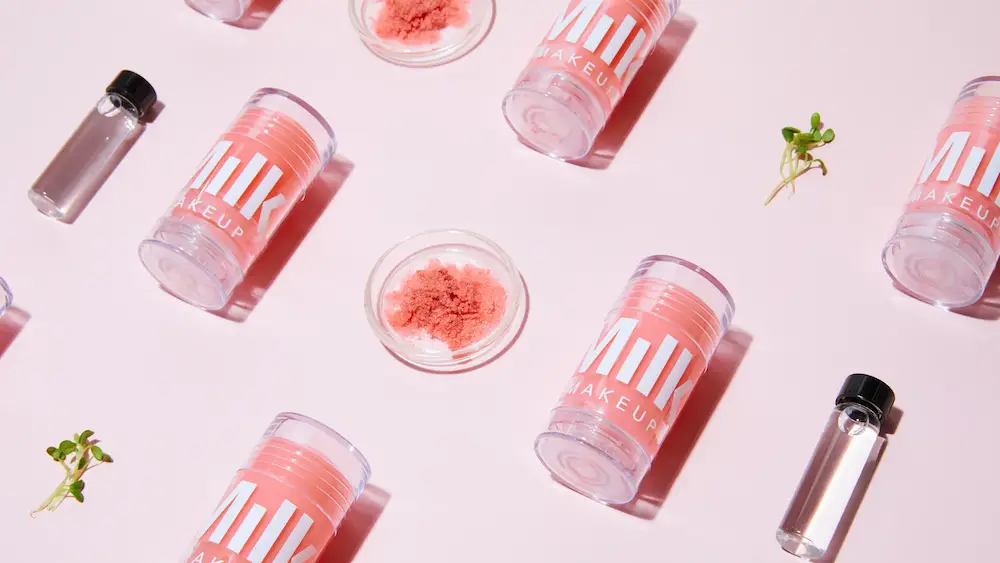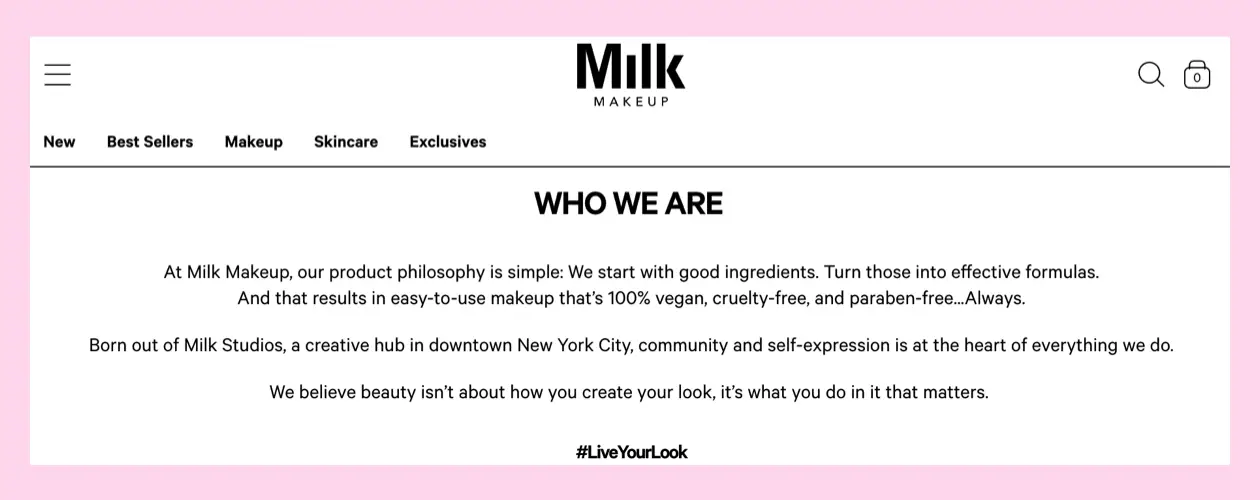Milk Makeup is all about using good ingredients to make effective formulas and easy-to-use cosmetics. But is creating cruelty-free and vegan products part of their belief system too? Find out here.
Milk Makeup is cruelty-free. It doesn't conduct animal testing on its products, nor does it distribute its cosmetics where animal testing is required by law. Milk Makeup is also 100% vegan – it doesn't use any animal-derived ingredients.
Milk Makeup was born out of a creative community hub in New York in 2016. Each of their products oozes the simplistic style that millennials dote over.
When you look at the badass, creative women behind the brand – you can see why it's so popular.
Milk Makeup was developed by Milk Studios co-founder Mazdack Rassi, product developer and COO Dianna Ruth, creative director Georgie Greville, and beauty + fashion editor and E! News correspondent Zanna Roberts Rassi.
After five successful years, Milk Studios sold the growing makeup brand to Waldencast Acquirement Corp in 2021. According to their investor presentation, Milk Makeup's estimated 2021 revenue was $47 million.
Before deciding on what to buy, here's what you need to know about Milk Makeup's current animal testing policies, vegan ranges, formulation, and sustainability.
Is Milk Makeup Cruelty-Free and Vegan?
Milk Makeup is 100% Cruelty-Free
It does not:
Milk Makeup has accreditation from Leaping Bunny – the only internationally recognized certification that guarantees a brand is cruelty-free.
The brand is also owned by Waldencast Acquirement Group, a private firm not known to be associated with animal testing.
The good news just keeps on rolling.
Milk Makeup is Vegan
Miracles do exist – this clean, fun, and accessible skincare brand is entirely vegan. It does not use any animal-derived ingredients in any of its products.
However, it's worth knowing that Milk Makeup is the exception and not the rule.
Most mainstream skincare brands are not 100% vegan. These are some animal-derived ingredients to look out for in general:
If you're interested in finding Milk's best vegan products or finding vegan brand alternatives – keep reading or click on this link: Milk Makeup vegan products.
Animal Testing Policy and History
Milk Makeup has always been committed to cruelty-free testing for its practical and inclusive product line.
Given the brand is relatively young also helps us ensure that they have had a clean track record from the get-go.
Cruelty-Free Status in 2022
Here is a screenshot of Milk Makeup's official statement regarding its cruelty-free policies and vegan products, taken from its website:
Certification
Milk Makeup is Leaping Bunny certified.
While you might know PETA very well – it surprisingly doesn't hold the strictest cruelty-free regulations. It seems to only require a brand's written consent that abides by the PETA code of conduct.
Certification from Leaping Bunny is ideal because it holds rigorous standards and does regular audits to ensure they are upheld.
Leaping Bunny certification proves that:
If you see a little PETA bunny stamp at the back of your product bottle – that's a really good sign. But don't be fooled by the image itself. A lot of brands are using fake logos to fool consumers.
Do your homework and see which products are genuinely cruelty-free first. This article will help you: Which Cruelty-Free Logos Can You Trust?
Is Milk Makeup Sold Where Animal Testing is Required By Law?
Milk Makeup does not distribute any of its products to China or any country that requires animal testing on any cosmetics by law.
China has a shocking track record. It is the country with the most amount of animal testing globally, with over 20 million animals used per year.
However, if you live in China or are concerned about its cruel beauty policies, there are a couple of loopholes to be aware of. Here's how to find cruelty-free cosmetics in China: Are Cosmetics Made in China Cruelty-Free?
The Best Vegan Milk Makeup Products
Let's get down to the fun part – Milk Makeup has an incredible selection range of vegan skincare and cosmetics, including a line for men.
The packaging has a utilitarian feel, but holographic flashes and bright touches balance that out. Ingredients like cannabis infusions in the KUSH range push boundaries and are pretty forward-thinking for the beauty industry.
If we were to shop the Milk Makeup range, here's where we'd spend our money.
For a complete list of Milk Makeups vegan products, you can check out their website.
Vegan Alternatives to Milk Makeup
Overall, Milk Makeup is an excellent option for vegans and provides vegan products that other brands haven't cared to try yet.
They have a clean track record and noteworthy transparency with their consumers.
It's 100% cruelty-free, vegan, and effective.
But if the brand is not easily accessible to you, here are some alternatives for you to try:
Is Milk Makeup Natural and Organic?
Milk Makeup it is not a natural or organic brand and doesn't market itself as such – yet!
As it stands:
Clean vs. Natural Ingredients
The term "natural" is not regulated for cosmetics and skincare. In other words, it doesn't hold one specific meaning.
Usually, it means a product is free of certain more toxic synthetic ingredients, including parabens, phthalates, sulfates, and more. But people also interpret "natural" to mean ingredients of immediate plant origin.
Here's the thing: "natural" is not always good. Just because an ingredient is natural doesn't mean you should rub it on your skin. Poison ivy is natural – but we wouldn't recommend rolling in a field of that stuff!
Almost all products use a certain amount of synthetic ingredients in their formulas, and Milk Makeup is no exception – but it chooses to use clean and uncontroversial synthetics.
If a synthetic ingredient is "clean," it is safe and non-toxic. Its purpose is to preserve the stability of a beauty formulation.
A few naturally derived ingredients Milk Makeup uses to enhance its cosmetics include.
Does Milk Makeup Use Safe Ingredients?
According to Skin Safe, Milk Makeup has an 82- 91% allergen-free ranking but some products rank as high as 100%.
As part of Milk Makeup's "clean beauty oath," all products are free of ingredients like parabens, sulfates, BHA, BPA, plastic microbeads, talc, urea, retinyl palmitate, mercury, formaldehyde, aluminum salts, and mineral oil.
They also avoid ingredients like irritants, coconut, paraffin, lanolin, nickel, gluten, and soy.
Reading the ingredient list is crucial because Milk Makeup is not 100% hypoallergenic or non-comedogenic, and they do not claim to be.
However, most of their products cater to these concerns, so make sure you buy what your skin needs.
The EU/UK Have Stricter Ingredient Regulations
As a conscientious shopper, you must read up on any brand's ingredient list before you purchase – especially if you live within the United States.
This is because the FDA has only banned or restricted 11 harmful chemicals from cosmetics within the country. Europe and the UK, on the other hand, have banned 1,328!
Milk Makeup will not use over 2500 controversial ingredients in its products. This includes all the ingredients prohibited by EU law and another 1200 on top of that. (Such overachievers in the best way possible).
Given the brand has such strict ingredient policies as part of its clean beauty oath, you don't need to worry too much about buying something potentially toxic.
But it's always better to be safe than sorry. So when you read any skincare or cosmetics labels, remember to avoid these ingredients:
Are Cruelty-Free Ingredients Safe?
If you're worried about how safe it is to use cosmetics that are not tested on animals – please relax and take a sigh of relief.
There is no reason why cruelty-free products shouldn't be just as safe, if not safer, than anything tested on an animal.
Not only is it easy to test ingredients without using animals altogether, but there are so many pre-approved ingredients you can use to make cosmetics that there really is no need.
Here's more on the subject if you're interested: Are Cruelty-Free Cosmetics Safe?
Is Milk Makeup Sustainable and Ethical?
Milk Makeup is all about transparency with its customers. They clearly explain where they are in their sustainability journey and admit that they want to improve.
As it stands, the cosmetics brand:
It's also no secret that the world has a huge waste problem, and cosmetic brands are only making it worse by using unsustainable packaging and harmful ingredients.
Some of the ways Milk Makeup is taking strong environmental accountability is by:
Final Thoughts
Milk Makeup goes above and beyond to be the kind of modern beauty brand that embraces what modern customers (you) want. It's vegan, cruelty-free, and more transparent when it comes to ethical and environmental issues than most big brands
We love what Milk Makeup stands for and the future they are trying to build in cosmetics.
And the fact that they are cruelty-free certified is also a step toward a more sustainable future in the industry.
The only thing we couldn't find was traceability of ingredients and fair trade accreditation – which we're encouraging the brand to share with us.
If you want to know more about their supply chain, we recommend sharing your thoughts with them.
Milk Makeup is a brand we'd happily purchase from. They get an A+ from the Cruelty-Free Soul team, and we can't wait to see what they do next.


